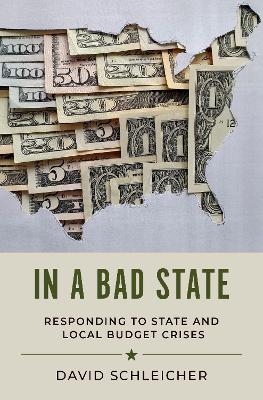
In a Bad State
Oxford University Press Inc (Verlag)
978-0-19-762915-4 (ISBN)
What should the federal government do if a state like Illinois or a city like Chicago can't pay its debts? From Alexander Hamilton's plan to assume state debts to Congress's efforts to respond to the COVID-19 pandemic, many of the most important political disputes in American history have involved federal government responses to state or local fiscal crises.
In a Bad State provides the first comprehensive historical and theoretical analysis of how the federal government has addressed subnational debt crises. Tracing the long history of state and local borrowing, David Schleicher argues that federal officials want to achieve three things when a state or city nears default: prevent macroeconomic distress, encourage lending to states and cities to build infrastructure, and avoid creating incentives for reckless future state budgeting. But whether they demand state austerity, permit state defaults, or provide bailouts-and all have been tried-federal officials can only achieve two of these three goals, at best. Rather than imagining that there is a single easy federal solution, Schleicher suggests some ways the federal government could ameliorate the problem by conditioning federal aid on future state fiscal responsibility, spreading losses across governments and interests, and building resilience against crises into federal spending and tax policy.
Authoritative and accessible, In a Bad State offers a guide to understanding the pressing fiscal problems that local, state, and federal officials face, and to the policy options they possess for responding to crises.
David Schleicher is a Professor of Law at Yale Law School. He is an expert in local government law, federalism, land use, state and local finance, and urban development. His work has been published widely in academic journals, including the Yale Law Journal and the University of Chicago Law Review, as well as in popular outlets like The New York Times, The Atlantic, and Slate. He has been called "the most important thinker we have on the subject of local government" and "ingenious" by National Review, one of the "most interesting writers on land use" by Washington Monthly, "interesting" by The Nation, "clever" by The Economist, "neat" by Slate, and "great but old fashioned" by Vox. He is also the co-host of the podcast, "Digging a Hole: The Legal Theory Podcast."
Part I: Why Is It So Hard To Get Out of a Bad State? An Introduction to the Problem of State and Local Fiscal Crisis
Introduction: Why It Is So Hard to Get Out of a Bad State
Part II: When We've Been in a Bad State: The Theory and History of Federal Responses to State and Local Fiscal Crises
Chapter 1: What Has Already Been Said About Federal Responses to State and Local Budget Crises? What Has Been Left Out?
Chapter 2: State Debt Crises Through the 1840s
Chapter 3: The Dual Debt Crises of the Post-Civil War Period
Chapter 4: State and Local Debt Crises in The Twentieth Century
Chapter 5: The Great Recession and State and Local Fiscal Crises
Chapter 6: COVID-19, the CARES Act, the MLF, and the ARP
Part III: Tools for Getting Out of a Bad State
Chapter 7: Introduction to the Principles for Responding to State and Local Fiscal Crises
Chapter 8: Building Better Bailouts
Chapter 9: Building Better Defaults
Chapter 10: Building Better Forms of State and Local Austerity
Chapter 11: Resilience, or Building a Better Federal System
Part IV: The Conclusion, Or Why States Are Often Bad
Chapter 12: Why States Are Often Bad
Notes
Index
| Erscheinungsdatum | 22.04.2023 |
|---|---|
| Zusatzinfo | 5 b/w halftones; 1 table |
| Verlagsort | New York |
| Sprache | englisch |
| Maße | 242 x 163 mm |
| Gewicht | 476 g |
| Themenwelt | Recht / Steuern ► EU / Internationales Recht |
| Recht / Steuern ► Öffentliches Recht | |
| Sozialwissenschaften ► Politik / Verwaltung ► Staat / Verwaltung | |
| Sozialwissenschaften ► Politik / Verwaltung ► Vergleichende Politikwissenschaften | |
| Sozialwissenschaften ► Soziologie ► Empirische Sozialforschung | |
| ISBN-10 | 0-19-762915-6 / 0197629156 |
| ISBN-13 | 978-0-19-762915-4 / 9780197629154 |
| Zustand | Neuware |
| Informationen gemäß Produktsicherheitsverordnung (GPSR) | |
| Haben Sie eine Frage zum Produkt? |
aus dem Bereich


